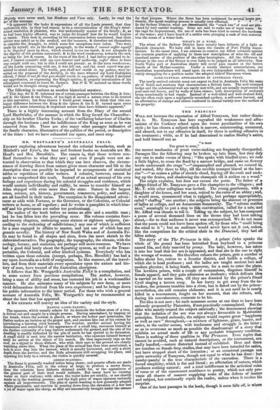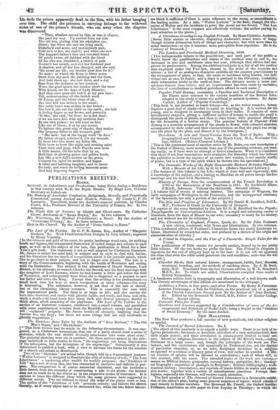THE PRINCESS
WILL not increase the reputation of Alfred Tennyson, but rather dimin-
ish it. Mr. Tennyson .has here engrafted the weaknesses and affec- tations of the Cockney school upon the worst peculiarities of his own style ; he has chosen a subject which is narrow, uninteresting, unnatural, and absurd, not to say offensive in itself, for there is nothing offensive in the treatment ; while, as if he had determined to realize Shelley's satire, and hold himself out as
"a man
Too great to scan,"
the merest mechanics of great verse-making are frequently disregarded. Passages like the following may be broken up into lines, but they defy any one to make verses of them : "She spake with kindled eyes; we rode a little higher, to cross the flood by a narrow bridge, and came on flowery levels underneath the crags"—" empanoplied and plumed, we entered in, and waited, fifty there to fifty, till the terrible trumpet blared at the bar- rier"—" as comes a pillar of electric cloud, flaying off the roofs and suck- ing up the drains, and shadowing the champain till it strikes on a wood." The origin explains, but does not excuse the poem. The father of a
college friend of Mr. Tennyson gave a fete champetre to the villagers ; and Mr. T. with other collegians was invited. The young gentlemen, with a daughter of the house, and her aunt, retired to the ruins of an abbey ; and, it would seem, commenced what is vulgarly, but perhaps appropriately, called" chaffing" one another ; the siiilleets being the absence or presence of ladies at college, and an Amazonian community. The "solemn maiden aunt," seemingly to pat a stop to this convirsatiod,' called for a tale, and Mr. Alfred was chosen to tell it. Taking up the subject, he has composed a poem of several thousand lines on the theme they had been talking about,—for to that audience it never was extemporized. We do not mean that the poem could not have been spoken 44 by those who "could bring the mind to it "; but an audience would never have sat it out, unless, like the competitors for the critical chair in the Duncia€1, they had all fallen asleep. The story of the The Princess is this. A prince (who speaks the
whole of the poem) has been betrothed from boyhood to a princess named Ida, and duly married by proxy. The lady, however, has taken it into her head that her sex is oppressed, and that she is the one to right the wrongs of women. She therefore refuses the prince, gets a number of ladies about her, retires to a frontier district, and builds a college, of which she is head professor ; and the ladies are taught ancient lore and modern physics ; it being death, moreover, for a man to enter the place. The lovelorn prince, with a couple of companions, disguises himself in female apparel, and they gain admission as students ; which delicate ides is carried on for some time, till they are detected by the prince's friend Cyril singing a tavern song. In -her hurry to get away from the in- truders, the princess tumbles into a river, but is fished out by the prince: nevertheless, she still remains obdurate; and it is not until he is nearly killed in a tournament, fought on her account, that she relents, and, during his convalescence, consents to be his. The idea is not new ; for such nonsense seems at one time to have been
seriously proposed by Platonists, if not practically contemplated. But the elder wits mostly treated the subject satirically; the denouement showinff that the isolation of the sex was not always favourable to MalsliTilen principles. Treated seriously, the subject would require great "happiness as well as care" throughout,—a mixture of lightness, grace, banter, and satire, in the earlier scenes, with tenderness and struggle in the latter ; so as to overcome as much as possible the disadvantage of a story that exhibits no actual mode of life or any probable temporary condition. There is nothing of these qualities in The Princess. Even topics that cannot be avoided, such as natural descriptions, or the tournament, are badly handled,—nature distorted instead of exhibited. Here and there are touches on female deep studies, that may have been intended for satire, but have stopped short of the intention ; or an occasional passage not quite unworthy of Tennyson, though not equal to what he has done : but namby-pamby is the true characteristic of the execution. There is a forced simplicity, which is fiat and literal ; an affectation of nature, which produces nothing natural ; and a total indifference to the artistica' rules of verse or of the commonest semblance to poetry, which not only pre- vents all chance of manner supplying some of the defects of matter and subject, but continually repels the reader, unless when it excites his
surprise. One of the best passages in the book, though it soon falls off, is where
Ida finds the prince apparently dead in the lists, with his father banging over him. The child the princess is carrying belongs to the widowed sister of one of the prince's friends, who ran away when the disguise Was discovered.
"Then, whether moved by this, or was it chance, She past my way. Up started from my side The old lion, glaring with his whelpless eye, Silent; but when she saw me lying stark, Dishelm'd and mute, and motionlessly pale, Cold seal to her, she sigh'd; and when she saw The haggard father's face and reverend beard Of grisly twine, all dabbled with the blood Of his own son, shudder'd, a twitch of pain Tortur'd her mouth, and o'er her forehead past A shadow, and all her hue changed, and she said,
saved my life; my brother slew him for it !'
No more: at which the King in bitter scorn Drew from my neck the painting and the tress, And held them up: she saw them, and a day Rose from the distance on her memory. When the good Queen her mother shore the tress With kisses, ere the days of Lady Blanche: And then once more she look'd at my pale face: Till, understanding all the foolish work Of Fancy, and the bitter close of all, Her iren will was broken in her mind; Her noble heart was molten in her breast; She how'd, she set the child on the earth; she laid A feeling finger on my brows, and presently '0 Sire,' she said, 'he lives: he is aot dead: 0 let me have him with my brethren here In our own palace: we will tend on him Like one of these; if so by any means To lighten this great clog of thanks, that makea Our progress falter to the woman's goal.'
"She said: but at the happy word he lives' My father stoop'd, refather'd, o'er my wounds. So those two foes above my fallen life, With brow to brow like night and evening mixt Their dark and gray, while Psyche ever stele A little nearer, till the babe that by us, Half-lapt in glowing gauze and golden brede, Lay like a new-falen meteor on the grass, Uncared for, spied its mother, and began A blind and babbling laughter, and to dance Its body, and reach its fatting innocent arms And lazy lingering fingers."



























 Previous page
Previous page